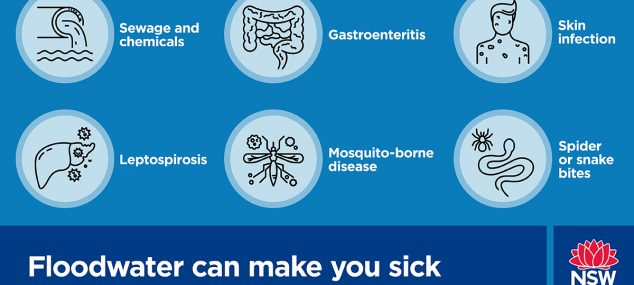Published
2021/04/09 at 8:10 am

With the ongoing rain and recent minor flooding across the region, residents are reminded to take care to avoid unnecessary contact with floodwaters and not swim in areas affected by floods or runoff.
“Floodwaters can contain many pollutants that are harmful to your health. You don’t know where the water has come from,” Director North Coast Public Health, Paul Corben, said.
“Avoid entering floodwater as it may be contaminated with raw sewage or chemicals from a backyard garden shed. These hazardous chemicals and germs can easily make you sick or lead to infection.
“Should you need to clean up please remember to wear safety equipment including boots, gloves and eye protection and wash your hands thoroughly.
“Never swim in floodwaters or near stormwater drains. Unpredictable currents and submerged hazards are very dangerous.”
People are advised to not swim in oceans for 24 hours after heavy rain. Avoid rivers, lagoons or estuaries affected by floodwaters and runoff for three days.
“Avoid swimming if you see signs of pollution such as discoloured water, oil or scum on the water, and litter or other debris floating in the water or on the tide line,” Mr Corben said.
“Swimming in contaminated water may cause illness, including ear infections, eye infections, fever and diarrhoea.”
If you rely on tank water, please be aware of the potential for contamination from polluted flood water and have your water tested and treated if necessary. If in doubt, use alternative clean water until the rainwater tank is confirmed safe to use.
Mosquitos and other disease-transmitting biting insects can also become a problem, particularly when floodwaters start to recede and leave still pools where insects quickly breed. Avoid insect bites by using insect repellent and wearing appropriate personal protection such as long sleeves, shoes and socks.
Click here for more advice on staying healthy during and after floods and storms.
If you need emergency assistance in a flood or storm, call the State Emergency Service (SES) on 132 500. For a medical, police or fire emergency call Triple Zero (000).